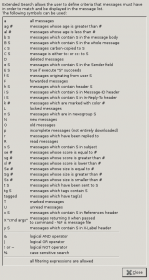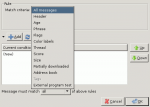This is a shot of the Epsilon Sigma Phi Conference Room, which...

This is a shot of the Epsilon Sigma Phi Conference Room, which will be available June 11th & 12th before (the 2 days before YAPC::NA 2012) for the Hackathon.

This is a shot of the Epsilon Sigma Phi Conference Room, which will be available June 11th & 12th before (the 2 days before YAPC::NA 2012) for the Hackathon.
I always wanted to write about Perl but never got the time to do. Recently came across to some of Neil Bowers published blogs which gave me the necessary push to write something useful. I feel honored to have worked with Neil Bowers in the past.
For the last 6 years or so I never got the opportunity to do any kind of web development. Although I kept in touch with all the web related stuff that is happening in the Perl e.g. Catalyst, Dancer, Moose. Also during my web development period, I never used any kind of MVC, ORM but these days everyone wants all these. So cut the long story short, I created the web app using the traditional perl-cgi-dbi logic, which as expected they didn't seem to approve it.
I've added a new article to my software-development / testing blog, called: Agile Scrum: Delivering Broken Software Since 1991 - looks at how Scrum can get subverted, and how to fix it. Enjoy!
first we can use find's exec opiton
find . -name CVS -exec ls -dl {} \;
also we can use shell
for i in `find . -name CVS` ; do echo -n $i," "; done
change ls, echo to whatever suits you, like rm -rf
We have a special treat for you today, a title unification match. In the corner to my right, haling from mysql.com, the undisputed world leader in users - MySQL! In the corner to my left, hailing from postgresql.org, the undisputed world leader in geek credibility - Postgres!
At YAPC::NA 2012 we will once and for all declare a winner in the RDBMS wars. Winner take all. Loser stripped of it’s title and goes home with it’s tail between it’s legs!
We only have two more weeks until YAPC::Asia Tokyo 2011!
I have secured what's called an "event insurance" which will cover any injuries or damages to the facility during the conference, so we're pretty much all set now. Just counting the days now...
And while we're at it, I'm happy to announce that YAPC::Asia Tokyo 2011 tickets are now completely sold out.
Normally we close the ticket sales while we still have a small amount of tickets left, but this year the tickets went very fast, well, we're now sold out, including about 70 student tickets -- this is particularly good, because we believe we need more young blood.
And due to the overwhelming number of inquiries, we're going to be selling a few tickets at the door (unfortunately this ticket will not have many of the benefits that come with the regular ticket :/ ). First come first serve, so if you haven't bought your tickets yet, come early on 10/14 to secure your ticket.
The review previously posted here is now hosted elsewhere.
http://learn.perl.org/ has just been relaunched.
New content, screencasts and step by step guides for people new to Perl.
The PerlFAQ has also been integrated and updated a bit (more to come). If you are interested in helping update the PerFAQ please visit the github repo or join us on irc.perl.org #perl-faq

Infinity Interactive is a New York based, multi-discipline consultancy that serves global organizations with local attention. We build simple websites, infrastructure for multi-national corporations and everything in between. Our strengths are our relationships with our partner companies and our focus on quality.
We are committed to open source software and are very active in the Perl community. Therefore we are proud to sponsor YAPC::NA 2012!
A friend asked my why I'm still using Bundle:: instead of the superior Task::
It was Bundle::CPANReporter2
If I install a Task for 5.15.3 plain and then install it for the debugging version, it does nothing and says "already installed". Different archlibs are not checked.
I had to do the following to install all the Task::Kensho XS modules:
$ perl -lne'/=item L<(.+?)[\|>]/ and print $1' <path-to-Task/Kensho.pm>
| xargs perl5.15.3d-nt -S cpan
Bundle::CPANReporter2 was only created to pull in required XS modules.
Plain perl modules are found in @INC anyway in the previous perls.
I've been using claws-mail as my email client for a while. Today I wanted to search all of my messages for some text and look through the results. When I couldn't figure out how to do that even after consulting the claws manual, I went to their official IRC channel.
For reference, here are some screenshots of the dialogs in question:


This is what happened:
LOINC's RELMA tool can display HTML details pages for each LOINC. Unfortunately, we have an over 800:1 file size ratio between the smallest set of details (like the Simple Display of 13308-2, Deprecated DNA) and the largest set of details (which may be the Comprehensive Display of 45981-8, MDS full assessment form - version 2.0, with 627 LOINCs totaling 13MB (300,000+ HTML DOM elements)).
Since we are speeding up RELMA by caching the generated pages, we decided to generate only 1 (one) file per LOINC and show/hide the various sections of the HTML using JavaScript. Previously, we generated a file for the Simple Display, the Comprehensive Display, and each type of Custom Display, re-using the filename for each display type so there was 1 (one) file created per LOINC but different file contents for each display type.
One thing that many people like to do when they travel is find restaurants and bars with rooftop seating. These kinds of places often have great views of the city, plus the crisp and refreshing air of the night sky. It’s hard to resist, especially since it’s only 3 blocks from YAPC.
Johnny O’s Sports Lounge is one such place in Madison, and they also have the distinction of being the closest restaurant/pub to YAPC to offer rooftop seating. An interesting feature of Johnny O’s is that they also offer basketball on the rooftop, as well as the a band on some nights.
While on the one hand, ORMs make up most of the published best practices for interfacing with databases, (see the success of DBIx::Class, and many other similar products), on the other hand, there is a certain amount of backlash against them, eg ORM is an Antipattern.
Hello fellow perl programmers!
Please note that the Belgian Perl Workshop 2011 will take place at "The Hub" in Brussels (http://brussels.the-hub.net/public/) on Saturday 15 October.
We are quite late on schedule. So please register your presence and talk submissions as soon as possible via the conference site http://conferences.yapceurope.org/bpw2011/
PS1: As every year, entrance will be free !
PS2: Please forward this message wherever you think it will get audience.
Recently I've decided that I should change the way I host my email. I've moved to fastmail.fm + offlineimap + Dovecot + Mutt. I've played with a few IMAP clients and am currently back to using Mutt like I used to ten years ago.
I wondered what email clients my friends are using. I could ask them all... or I could write a program to query the London.pm and perl5-porters mailing lists for email user agents (one random email per email address) for the last year.
London.pm results
76 Gmail
29 Mutt
27 Thunderbird
22 Apple Mail
7 Alpine
6 Evolution
4 KMail
4 Gnus
3 SquirrelMail
3 Exchange
2 Unknown
2 Internet Messaging Program
2 Claws Mail
1 YahooMailRC
1 tin
1 RoundCube Webmail
1 Postbox
1 Pine
1 Opera Mail
1 Microsoft Outlook
1 LinkedIn
1 iPhone Mail
1 iPad Mail
1 Hotmail
1 Blackberry
perl5-porters results
We’ve covered a number of other bus services to get you to YAPC, but Lamers Bus Line offers something a bit different. All the other bus services will get you here if you’re traveling from a major hub like Chicago, Milwaukee, or Minneapolis. Lamers has daily service from smaller cities all over Wisconsin. So if you’re from Wisconsin, but you’re from one of those less serviced regions, then check this out. They have daily service from the North:
From the North East:
From the South West:
All of these locations drop off at the UW Madison campus (where YAPC is being held). And perhaps best of all, they do this for less than $40. So if you live in Wisconsin, but don’t want to drive or can’t, then this is a great short range travel option for you.
DBD::Firebird now passes all its tests on Fedora 15 with a simple
perl Makefile.PL && make && ISC_PASSWORD=$password make test
Very cool and most appreciated!
The DBD::SQLite team shipped a new developer release (version 1.34_01) with a patch by Mark Dootson. It should fix a long-standing "not an error" issue under the mod_perl/CentOS environment (reported and discussed in several tickets). I confirmed the bug was gone under the CentOS 5.5, but if you find it still remains under your (probably rather old) environment, please let us know via RT, mailing list, or #dbd-sqlite@irc.perl.org. Thanks.
I've been running into more and more code which uses Moose, and doesn't use strict. The logic being that since Moose uses strict, your code doesn't need to.
Is there something about Moose's use of strict that differs from other modules that use strict? Say for instance that if I use Carp in my code (which uses strict), is it still ok not to use strict?
What worries me as someone who works on legacy systems where code doesn't use strict, is that best practices are de-evolving. New Perl programmers will see code that uses Moose but not strict, and go on to write programs that don't use Moose and also don't use strict. It makes me wonder if the practices that are being implemented in Modern Perl for the benefit of experienced users will set bad precedents for inexperienced users.
Hey 5.16 developers, can you enable strictures and warnings by default? Now that makes sense to me.
blogs.perl.org is a common blogging platform for the Perl community. Written in Perl with a graphic design donated by Six Apart, Ltd.